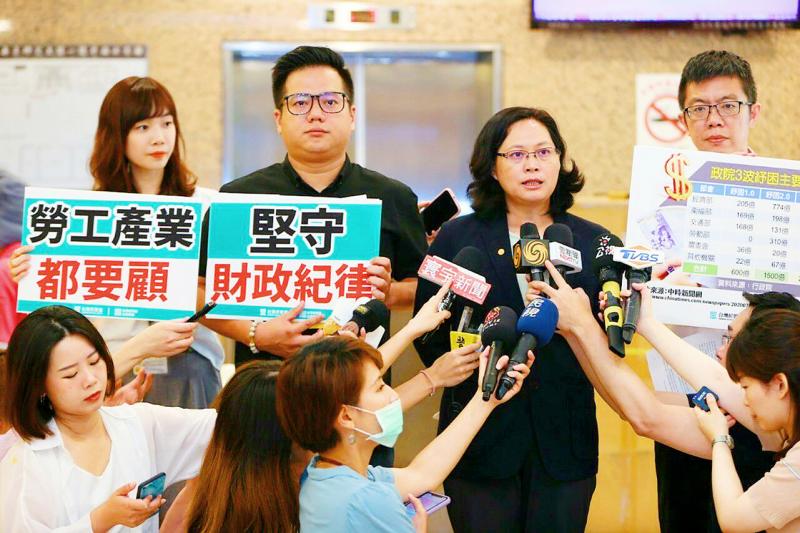Premier Su Tseng-chang (蘇貞昌) yesterday defended the high cost of the government’s Triple Stimulus Vouchers in response to criticism that it had breached expenditure rules in appropriating from other budgets to pay for the program.
The Directorate-General of Budget, Accounting and Statistics (DGBAS) on Thursday told a news conference that the voucher program, which began on Wednesday last week, cost the nation NT$51.1 billion (US$1.73 billion) — far more than the government’s initial NT$2.3 billion estimate.
The government had run a deficit of NT$38.2 billion to issue the vouchers, which is to be offset by a second NT$210 billion special budget proposed by the Executive Yuan, the DGBAS said.

Photo: Chen Yun, Taipei Times
The announcement drew criticism from Taiwan People’s Party (TPP) legislators, who yesterday held a news conference accusing the government of spending taxpayers’ money without legislative approval.
The lawmakers said that the Executive Yuan breached financial procedures, and then expects the opposition to stomach its budget proposal.
However, Su said that as the COVID-19 pandemic continues in other countries, the nation is experiencing a period of economic recovery, and people can go shopping, which should be attributed to the collaborative effort of government agencies.
Just as it did to contain the virus, the government has also adopted a proactive approach to revitalizing the economy, which has benefited 12 million people since the Legislative Yuan in March approved the special budget, he said.
The Special Act on COVID-19 Prevention, Relief and Recovery (嚴重特殊傳染性肺炎防治及紓困振興特別條例) allows agencies to tap its budget or the budgets of other agencies to carry out disease prevention or economic stimulus with the Executive Yuan’s approval, Su said.
The advance payment for the vouchers was decided to best serve the public interest, he added.
In related news, a poll released yesterday by the Chinese Nationalist Party’s (KMT) National Policy Research Foundation showed that almost 50 percent of respondents believed that the Triple Stimulus Vouchers are ineffective in revitalizing the economy.
The foundation said that the results show that the Democratic Progressive Party needs to propose another special budget to boost the economy.
The various digital vouchers that have been issued by government agencies are a way to distract from a gloomy economic outlook, the foundation said.
The foundation was referring to vouchers issued by several government agencies, including the Ministry of Economic Affairs’ “Arts FUN Go” vouchers and the Council of Agriculture’s vouchers to encourage people to visit and shop at recreational farms, as well as the Sports Administration’s vouchers to encourage people to attend events or purchase sports gear.
The survey also found that 63 percent of people are pessimistic about the economy, while 71 percent believe that the actual number of furloughed people is higher than the figures published by the Ministry of Labor.
The poll was conducted from Tuesday to Thursday last week, and collected 1,077 valid samples. It had a margin of error of 2.99 percentage points.
Additional reporting by Shih Hsiao-Kuang

A preclearance service to facilitate entry for people traveling to select airports in Japan would be available from Thursday next week to Feb. 25 at Taiwan Taoyuan International Airport, Taoyuan International Airport Corp (TIAC) said on Tuesday. The service was first made available to Taiwanese travelers throughout the winter vacation of 2024 and during the Lunar New Year holiday. In addition to flights to the Japanese cities of Hakodate, Asahikawa, Akita, Sendai, Niigata, Okayama, Takamatsu, Kumamoto and Kagoshima, the service would be available to travelers to Kobe and Oita. The service can be accessed by passengers of 15 flight routes operated by

GIVE AND TAKE: Blood demand continues to rise each year, while fewer young donors are available due to the nation’s falling birthrate, a doctor said Blood donors can redeem points earned from donations to obtain limited edition Formosan black bear travel mugs, the Kaohsiung Blood Center said yesterday, as it announced a goal of stocking 20,000 units of blood prior to the Lunar New Year. The last month of the lunar year is National Blood Donation Month, when local centers seek to stockpile blood for use during the Lunar New Year holiday. The blood demand in southern Taiwan — including Tainan and Kaohsiung, as well as Chiayi, Pingtung, Penghu and Taitung counties — is about 2,000 units per day, the center said. The donation campaign aims to boost

ENHANCING EFFICIENCY: The apron can accommodate 16 airplanes overnight at Taoyuan airport while work on the third runway continues, the transport minister said A new temporary overnight parking apron at Taiwan Taoyuan International Airport is to start operating on Friday next week to boost operational efficiency while the third runway is being constructed, the Ministry of Transportation and Communications said yesterday. The apron — one of the crucial projects in the construction of the third runway — can accommodate 16 aircraft overnight at the nation’s largest international airport, Minister of Transportation and Communications Chen Shih-kai (陳世凱) told reporters while inspecting the new facility yesterday morning. Aside from providing the airport operator with greater flexibility in aircraft parking during the third runway construction,

MORE FALL: An investigation into one of Xi’s key cronies, part of a broader ‘anti-corruption’ drive, indicates that he might have a deep distrust in the military, an expert said China’s latest military purge underscores systemic risks in its shift from collective leadership to sole rule under Chinese President Xi Jinping (習近平), and could disrupt its chain of command and military capabilities, a national security official said yesterday. If decisionmaking within the Chinese Communist Party has become “irrational” under one-man rule, the Taiwan Strait and the regional situation must be approached with extreme caution, given unforeseen risks, they added. The anonymous official made the remarks as China’s Central Military Commission Vice Chairman Zhang Youxia (張又俠) and Joint Staff Department Chief of Staff Liu Zhenli (劉振立) were reportedly being investigated for suspected “serious